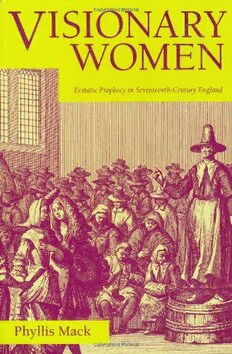
Visionary Women: Ecstatic Prophecy in Seventeenth-Century England PDF
490 Pages·1995·11.426 MB·English
Most books are stored in the elastic cloud where traffic is expensive. For this reason, we have a limit on daily download.
Preview Visionary Women: Ecstatic Prophecy in Seventeenth-Century England
Description:
This study of radical prophecy in 17th-century England explores the signficance of gender for religious visionaries between 1650 and 1700. Phyllis Mack focuses on the Society of Friends, or Quakers, the largest radical sectarian group active during the English Civil War and Interregnum. The meeting records, correspondence, almanacs, autobiographical and religious writings left by the early Quakers enable Mack to present a textured portrait of their evolving spirituality. Parallel sources on men and women provide a unique opportunity to pose theoretical questions about the meaning of gender, such as whether a "women's spirituality" can be identified, or whether religious women are more or less emotional than men.
See more
The list of books you might like
Most books are stored in the elastic cloud where traffic is expensive. For this reason, we have a limit on daily download.
